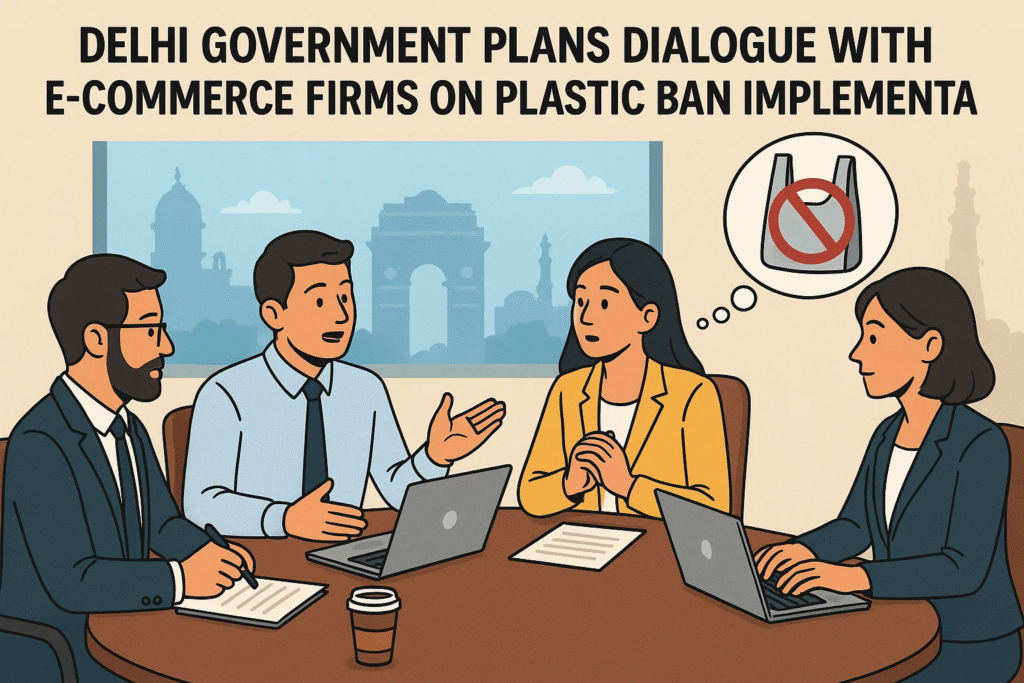In a major step toward creating a cleaner and greener Delhi, the state government has announced its plan to hold detailed discussions with major e-commerce companies regarding the effective implementation of the plastic ban across the city. This dialogue is expected to bring together representatives from leading online platforms such as Amazon, Flipkart, Blinkit, Swiggy, Zomato, and others.
The objective is to ensure that single-use plastic (SUP) — especially packaging materials used in online deliveries — is eliminated or replaced with eco-friendly alternatives. This initiative follows years of concern over the massive rise in plastic waste generated by online shopping and food delivery services.
The Context: Plastic Ban in Delhi
Delhi has been one of India’s leading states in implementing environmental reforms. However, enforcing a total ban on single-use plastics has faced challenges due to the widespread dependency on plastic packaging.
The Central Pollution Control Board (CPCB) and the Delhi Pollution Control Committee (DPCC) have repeatedly issued guidelines restricting the use of plastic carry bags, straws, and cutlery. Yet, compliance from both consumers and industries — particularly e-commerce and food delivery platforms — remains inconsistent.
To address this, the Delhi Government’s Environment Department has decided to engage in direct dialogue with industry leaders, aiming for practical and scalable solutions.
Why E-commerce Platforms Are in Focus
E-commerce and food delivery companies are major contributors to plastic packaging waste. Every day, thousands of parcels are delivered across the city, often wrapped in multiple layers of plastic — including bubble wrap, air cushions, and plastic tapes.
While many firms have introduced recycling initiatives, the overall shift to sustainable packaging has been slow. The government believes that bringing these companies into formal consultation will:
-
Encourage accountability
-
Foster innovation in packaging alternatives
-
Align with India’s national mission on reducing plastic waste
The focus is not just on banning but on building a circular economy — where materials are reused, recycled, and reintroduced into the production chain.
Objectives of the Delhi Government’s Initiative
| Objective | Description | Expected Outcome |
|---|---|---|
| Enforcement of Plastic Ban | Ensure strict adherence to national and local plastic ban laws across all online and offline markets. | Reduced plastic waste in landfills and rivers. |
| Industry Collaboration | Engage with e-commerce giants to find feasible and sustainable packaging solutions. | Greater industry cooperation and innovation. |
| Public Awareness | Educate consumers about sustainable alternatives and encourage responsible consumption. | Improved participation from citizens. |
| Alternative Development | Support local manufacturers in developing biodegradable packaging materials. | Boost to local eco-industries and employment. |
| Monitoring and Compliance | Introduce digital tools to track packaging waste from e-commerce operations. | Data-driven policymaking and better accountability. |
Challenges in Implementing the Plastic Ban
Despite the government’s strong intent, several practical challenges continue to slow progress:
1. Lack of Viable Alternatives
While paper and jute options exist, they often cost more and lack the same durability as plastics. For smaller businesses, this transition becomes financially challenging.
2. Consumer Behavior
Many consumers still prefer plastic for its convenience and reusability. Changing habits requires sustained awareness campaigns.
3. Supply Chain Complexity
E-commerce operations involve multiple vendors, packaging layers, and logistics partners. Ensuring compliance at each step is complex.
4. Limited Recycling Infrastructure
Delhi generates around 1,000–1,200 tonnes of plastic waste daily. The city’s recycling capacity is still insufficient to handle such volumes effectively.
5. Regulatory Enforcement
Even though penalties exist, ground-level monitoring and enforcement remain inconsistent across markets and delivery zones.
E-commerce Firms’ Response to the Plastic Ban
Major online firms have acknowledged the government’s concern and have shown willingness to cooperate. Some have already begun implementing pilot programs:
-
Amazon India has introduced “paper cushions” instead of plastic fillers in some regions.
-
Flipkart claims to have eliminated 100% single-use plastic in packaging across its supply chain.
-
Swiggy and Zomato have started promoting paper boxes and biodegradable cutlery.
-
Blinkit and BigBasket are exploring reusable delivery bags and return packaging systems.
However, the challenge lies in uniform adoption — ensuring that every seller and delivery partner complies with eco-packaging standards.
Government’s Planned Approach
The Delhi government’s upcoming dialogue is expected to include representatives from:
-
Delhi Pollution Control Committee (DPCC)
-
Environment Ministry officials
-
Industry leaders and sustainability experts
-
E-commerce and food delivery representatives
The meeting will focus on three key areas:
-
Implementation Framework – Defining the timeline and scope of compliance for all online sellers.
-
Support Systems – Providing incentives and subsidies for businesses adopting sustainable packaging.
-
Monitoring & Reporting – Setting up digital dashboards for waste tracking and public transparency.
Eco-friendly Alternatives Under Consideration
| Alternative Material | Usage Area | Environmental Benefit |
|---|---|---|
| Paper Packaging | Food parcels, delivery boxes | Biodegradable and recyclable |
| Cornstarch Bioplastics | Wrapping materials | Compostable and non-toxic |
| Jute & Cotton Bags | Grocery and apparel deliveries | Reusable and strong |
| Recycled Cardboard | Parcel packaging | Reduces demand for virgin materials |
| Mushroom Packaging | Electronic and fragile goods | 100% biodegradable |
| Glass Containers | Food delivery and beverages | Long lifespan and reusable |
The government may also explore local production units for these materials to support micro, small, and medium enterprises (MSMEs) in Delhi.
Environmental Impact of Plastic Waste in Delhi
Plastic pollution has become one of the most pressing environmental crises in the capital:
-
Over 10% of Delhi’s municipal waste consists of single-use plastics.
-
Plastic waste clogs drainage systems, contributing to flooding during monsoons.
-
Burning plastic releases harmful dioxins and carcinogens, deteriorating air quality.
-
River Yamuna has been severely affected by microplastics.
This highlights why the dialogue with e-commerce companies is not just regulatory but an urgent environmental necessity.
Role of Consumers in Supporting the Plastic Ban
While industries play a big role, consumers are equally responsible for driving change.
Here’s how Delhi residents can contribute:
-
Opt for “no plastic packaging” options when available on apps.
-
Return packaging to delivery agents or collection points.
-
Support eco-conscious brands using biodegradable materials.
-
Segregate waste properly to help recycling units function effectively.
-
Spread awareness on social media to influence others.
Behavioral change at the consumer level can significantly accelerate Delhi’s transition to a plastic-free economy.
How the Dialogue Could Shape Future Policy
Experts believe this dialogue could set a national benchmark for other Indian cities. If successful, Delhi’s model can be replicated in other metros like Mumbai, Bengaluru, and Hyderabad.
Potential outcomes include:
-
Joint sustainability framework for all e-commerce players.
-
Mandatory packaging labeling indicating material type and recyclability.
-
Incentives for startups producing biodegradable packaging materials.
-
Regular audits of packaging practices across industries.
This initiative might also integrate with India’s Extended Producer Responsibility (EPR) framework, ensuring that manufacturers take accountability for post-consumer waste.
Voices from the Industry
Industry insiders have expressed a mix of optimism and concern.
-
Some believe collaboration will drive innovation and create new business opportunities.
-
Others caution that rapid enforcement without infrastructure could disrupt supply chains and increase costs for small sellers.
Nevertheless, most stakeholders agree that dialogue is the right step forward — balancing environmental responsibility with economic practicality.
Expert Opinions
Environmentalists and economists alike view the move as timely and strategic.
“Engaging e-commerce firms is essential. Without tackling packaging waste, no plastic ban can succeed,”
— said a senior environmental researcher from TERI (The Energy and Resources Institute).
Economists add that this shift could open a new green economy, generating thousands of jobs in recycling and sustainable materials manufacturing.
The Road Ahead
The Delhi Government’s approach is expected to unfold in three phases:
-
Consultation Phase: Meetings with stakeholders, data collection, and pilot testing of alternatives.
-
Implementation Phase: Roll-out of new packaging standards and compliance mechanisms.
-
Monitoring Phase: Regular inspections, public dashboards, and enforcement of penalties for violators.
This stepwise approach ensures that the shift is gradual yet firm, minimizing disruption to the market while maximizing environmental gains.
Conclusion
The planned dialogue between the Delhi Government and e-commerce companies marks a turning point in India’s environmental governance. It reflects a growing understanding that sustainability cannot be achieved in isolation — it requires collaboration, innovation, and public participation.
If executed effectively, this initiative could reduce thousands of tonnes of plastic waste annually, improve urban hygiene, and position Delhi as a national leader in sustainable urban management.
The message is clear: economic growth and environmental responsibility must go hand in hand. E-commerce firms, consumers, and policymakers all share the collective duty to build a greener, cleaner, and healthier future for Delhi.


